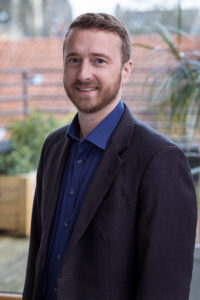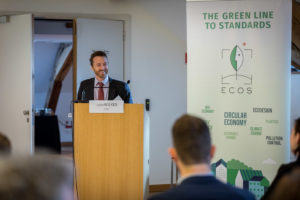Tap into the collective power of influential business and NGO pioneers to create new strategies and
tactics to build a more socially and environmentally conscious world.

Tap into the collective power of influential business and NGO pioneers to create new strategies and
tactics to build a more socially and environmentally conscious world.
Justin Wilkes
Company/NGO Name:
ECOS
Region, Country:
Belgium, Europe

What is the mission of your company/NGO?
ECOS is an international network of environmental NGOs defending environmental interests throughout the policy process. We work to influence the development of ambitious standardization, legislation and political strategies to promote the transition to a circular economy and combat climate change.
How have those projects positively impacted the local community and/ or your country?
See above
What is the most innovative or environmentally/socially impactful project/practice your company/NGO has implemented?
1) In October 2019 the European Union adopted new laws which will make household products easier to repair and more energy efficient, saving people money as well as reducing pollution. This is a fantastic ending to a complicated and lengthy process, which ECOS influenced from beginning to end.
Thanks to our involvement in designing an ambitious set of laws as part of the so-called Ecodesign Package, household products sold in Europe will be more efficient and will have to meet minimum repair ability requirements aimed at extending their lifetime. You can read more here.
2) ECOS has led the development of an ambitious European standard that will help design repairable, reusable and upgradable products. The resulting “Repair Standard” (EN 45554) paves the way for a market transition towards more repairable, reusable and upgradeable products. You can read more here.
Please share any new projects you will be implementing in the near future.
We design in 80% of the environmental impact of our products. Therefore, if we can apply ecodesign principles to more and more sectors – particularly those sectors with high environmental impacts (e.g. construction, textiles, plastics, batteries & automotive) then we can achieve much more of a circular economy that reduces resource use. By setting a minimum environmental performance for products we can eliminate those that damage the environment from the market.
What are your top 3 career accomplishments?
While working for WWF I contributed to the European Union’s legislation on chemicals, which seeks to ensure that chemicals of high concern (hazardous for the environment and/or human health) are properly controlled and substituted by safer alternatives. Working to ensure strict legislation for chemicals that cause cancer, are mutagenic or toxic to reproduction, or are persistent and bioaccumulate in our environment and bodies, or disrupt our hormone systems, is such an environmentally critical issue, and to be part of the success that WWF achieved in making the laws ambitious is a clear highlight.
It’s great that at ECOS we work with a US member of ours, the Green Science Policy Institute, on restricting hazardous chemicals in products.
What inspired you to choose your career path?
International relations is my academic background, security policy and energy security was my interest, therefore environmental policy was an obvious area where it is so important for governments to coordinate and work together for the common good.
Personally—Why do you care about sustainability? What is your story?

Conference Photography by Dani Oshi. Plastics in a Circular Economy. Assignment for ECOS, Brussels, Belgium
I’ve always had an affinity for nature – particularly temperate climes, bears, wolves, lynx, deer, and how people as a species fit into an ecosystem, historically, today and in the future.
What is/are the biggest incentive(s) for businesses in your country to adopt sustainable practices?
Businesses need markets that work. Working markets need good regulation and failures need to be corrected. Incentivizing business through regulation and market pull are the strongest incentives in the European Union.
What is/are the biggest environmental or social challenge(s) facing your country today?
Climate change and circular economy. The European Green Deal is vital to give the economy the direction it needs, and provide the incentives to adapt to an economy that runs on renewable energy, and is more circular and less linear.
What is the most positive action your country has taken to positively impact its environment or social well-being?
The European Green Deal.
What are your thoughts on climate change? What is your company/organization doing to help bring awareness or to help mitigate climate change?
With the effects of climate change becoming increasingly visible and a growing determination to prevent a dramatic global temperature increase of 2°C, ECOS aims at full decarbonization and circularization of the economy.
We want to make sure that laws and environmental standards contribute to a successful achievement of the Paris Climate Agreement, the Montreal Protocol, and the EU “Clean Planet for All” strategy, by making clean-tech solutions easily accessible to consumers and the market – be they electric vehicles, smart grids, or low global warming potential refrigerants.
What are the biggest challenges you have faced when pursuing or trying to promote sustainable practices/projects?
Business as usual domination of industry associations. Market domination and incumbency means progressive businesses are not served sufficiently well by chambers, business, and industry associations and lobbies.
How dedicated are your nation’s businesses to corporate social responsibility? List some practices you think would be helpful.
CSR has proved useful. Voluntary sustainability Standards help too. What we need is a race to the top. Legislation is crucial to do that, particularly if the big markets do that, be that California or the European Union.
Keep up with Justin Wilkes and ECOS on social media:
Website: https://ecostandard.org/
LinkedIn: http://linkedin.com/company/ecos-eu
Twitter: http://twitter.com/ECOS_Standard